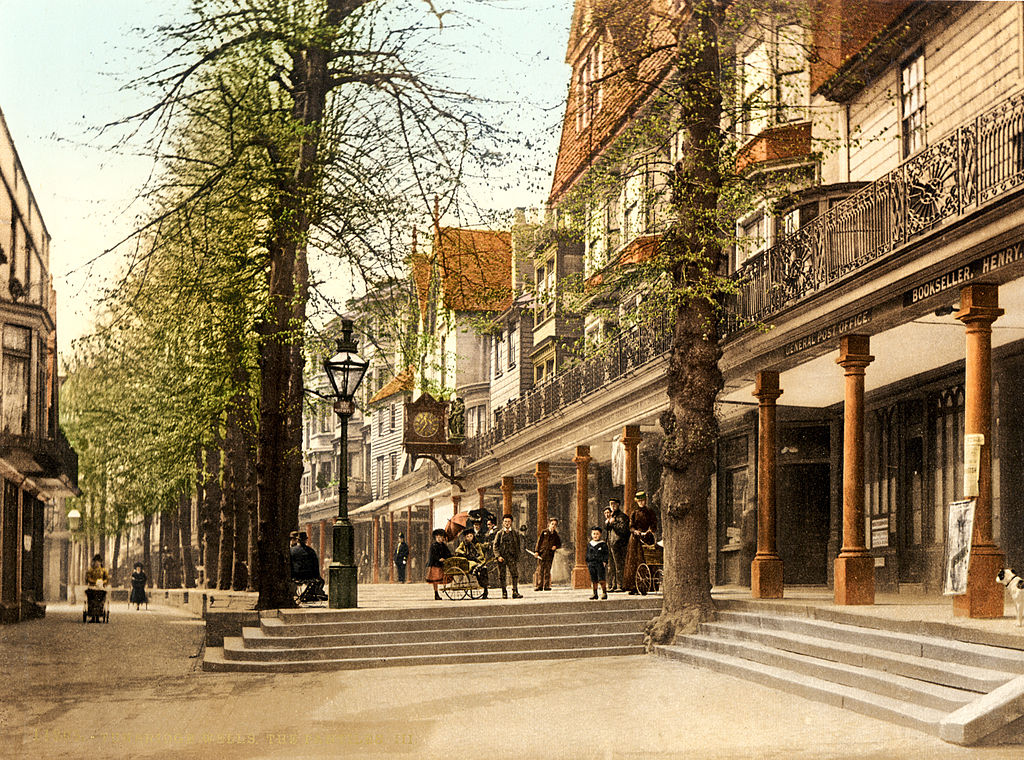
Detroit Publishing Co.
under license from Photoglob Zürich, Public domain, via Wikimedia Commons
I first encountered Eugénie Clayworth as the beneficiary of the 1912 Will of Matilda Wright who died at the considerable age of ninety-three in a small hotel in Tunbridge Wells. [1] Although Matilda left £2,000 to her second cousin George Wright, along with some family silver, a gold crest and family miniatures, the bulk of her not inconsiderable estate was left to Eugénie. It amounted to about £9,800 – equivalent to an income value of over £5.5 million today.
My first reaction was that this ‘friend and companion’, who was considerably younger than Matilda, had perhaps been a gold digger, but this was dismissed when I discovered that when Eugénie herself died nearly a quarter of a century later in 1946, the net value of her estate was £13,495 12s 2d. Although the actual value of this had depreciated over time, it looks as if she had hardly dipped into the capital over the years. Of course, this does assume that she had no money of her own which may be incorrect as in the 1911 census she was shown as being of private means.[2]
The lives of Matilda and Eugénie conjure up visions of a Miss Marple world of genteel single women living out their lives in seaside hotels and spa towns, perhaps taking tea with the vicar using the monogrammed silver cutlery mentioned in Matilda’s Will.
Matilda’s earlier life is easy to trace apart from a gap between 1878 and 1911. She was the daughter of Henry Wright for many years the vicar of Winkleigh in Devon, who was in turn the son of a Derby Silk Merchant called John Wright who had died young at the family’s warehouse premises of 20 Milk Street, off Cheapside, London in 1792. [3]
Matilda was baptised by her father, who was the curate there, in Hartpury, Gloucestershire on 01 February 1819, the third of six children. [4] Matilda’s brother Henry John and both her parents were buried at Winkleigh between 1838 and 1856. [5] [6] [7] Her brother Frederic trained as a solicitor but died at Livorno, Italy on 20 January 1864, described in his newspaper death notice as ‘late of the 20th regiment’. [8]
A sister called Julia probably died young, and the three surviving sisters Harriet, Matilda and Jessie were staying in Matlock Bath at the time of the 1861 census when all were recorded as ‘Holder of Dividends’. [9] In 1864 shortly before the death of Frederic, Harriet, Matilda and Jessie were all staying with him in Livorno. It is possible they had travelled there knowing he was dying as his Will which mentions their presence was written on the 14 January and he died six days later.[10]
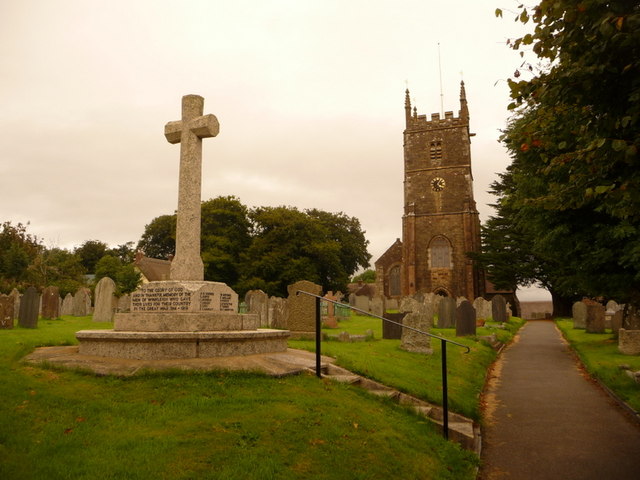
Photograph by Chris Downer (Wikimedia Commons)
By the time of the 1871 census Harriet and Matilda were living at 21 Queens Road, Tunbridge in Kent, in a newly built house they had named Winkleigh Villa, together with two servants. [11] In 1878 Harriet was listed at Winkleigh Villa as one of the shareholders affected by the collapse of the West of England Bank, and they had left the Queens Road house before the 1881 census was taken. [12]
In 1887 a single woman called Matilda Wright living in Hastings was mentioned in a newspaper report as the victim of the theft of a gold watch, gold chain, locket, cross, seal and a black fur cape. [13] As Matilda’s Will mentioned a gold seal, and the presumed thief was apprehended and charged, this may have been her. No marriage or death records have been found for Jessie or Harriet Wright who don’t appear to have been buried at Winkleigh, so the last sighting I have found for Jessie was 1864 and for Harriet in 1878.
It is plausible to suggest that, following the sale of Winkleigh Villa, forced by the loss of some of their investment income, Harriet and Matilda moved from one boarding house and small hotel to another perhaps also travelling abroad, until Matilda ended up at 7 Vale Royal in Tunbridge at the time of the 1911 census when she is finally visible once more. Perhaps the loss of her dividend income may account for why Harriet appears not to have left a Will, although, since I have no definite date of death for her, this remains uncertain.
In any case by 1911 Matilda, now aged ninety-two, was living at 57 London Road Tonbridge Wells in a boarding house run by Elizabeth Parks and Alice Heasman. One other single woman, and an architect, his wife and adopted daughter shared the house with two maid attendants, a general servant and Eugénie Clayworth – ‘Lady Companion’ living on private means.
Matilda died on 23 May 1912 and her body was taken to Winkleigh for burial on the 29th. [14]
What intrigued me about Eugénie , apart from her ultimate inheritance from Matilda, was that she was born in St Petersburg, Russia. This caught my attention because the silk merchant Wright family had long-standing Russian connections. Matilda’s great uncle Thomas Wright spent many years in St Petersburg where he married Natalia Feodorovna Bertoojef in 1809 and nine of their ten children were born there. Her great uncle Job had extensive trading connections there, as did Thomas’s son Thomas Wendt Wright three of whose children were born there. The name Natalia occurs a number of times in the family throughout the nineteenth century.
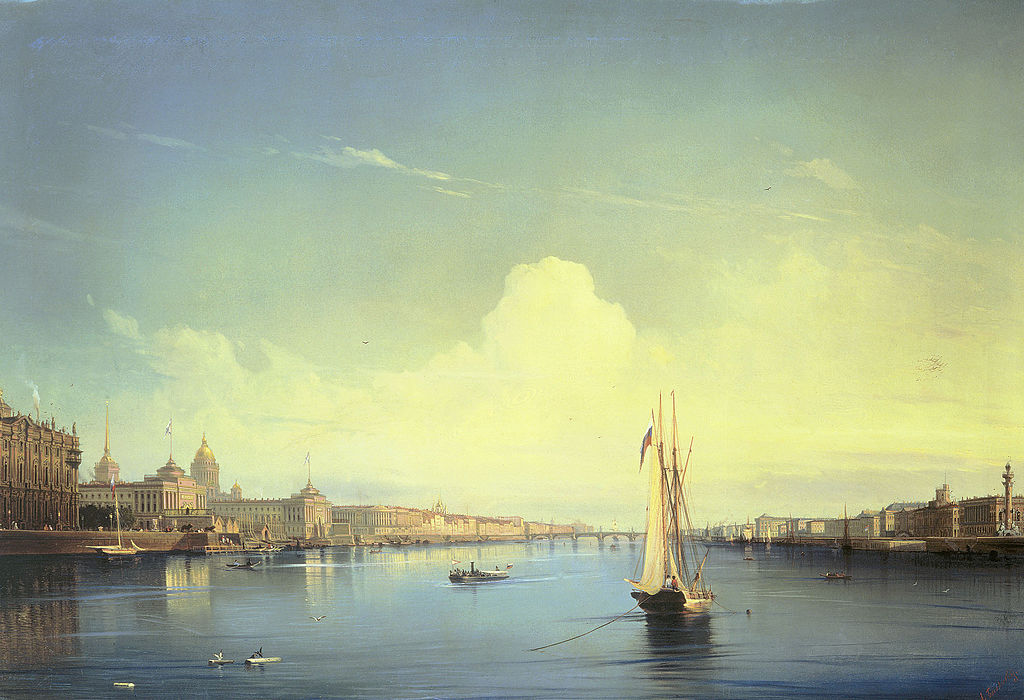
by Alexey Bogolubov (Wikimedia Commons)
According to the 1939 Register, Eugénie was born on the 23 May 1862, and according to several census records this was in St Petersburg, Russia. Eugénie first appears in British records in the 1881 Scottish census when she was in Glasgow, recorded as nineteen year old visitor in the household of a manufacturing chemist called Matthew Brown, and listed as a British subject born in Russia. [15] Ten years later she was listed as a visitor in Edinburgh working as a teacher of languages, born in Russia but with no mention of her citizenship.
Then in 1899, while resident in Scarborough, Yorkshire, she applied for naturalisation as a British citizen. In her application she gave her age as thirty-seven, her place of birth at St Petersburg but ‘the names and nationalities of her parents are unknown to her’.[16]
It is possible that Eugénie really did not know who her parents were, but it is also possible that she did, but was illegitimate and preferred to conceal the fact. At around the time of her birth there was a Clayworth family in St Petersburg – Thomas Clayworth had several children born there including a son called Joseph, listed in the 1851 England census as an Apprentice Engineer at Greenwich who was a British Subject born in Russia. [17] He died in 1868 with probate on his estate not being granted until 1892. Could he have been Eugénie ’s father?
We will never know. Nor do I know how she acquired an education and sufficient money to travel to Scotland as a teenager and carve her own path in life as a teacher and genteel companion.
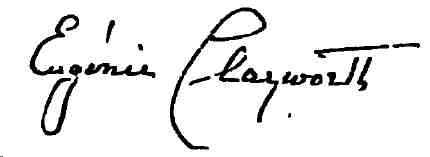
Perhaps it was the Russian connection that led Matilda to employ her, or perhaps it was pure co-incidence. I have found no suggestion that she might have been a blood relation. Nevertheless, when Eugénie died, just after the Second World War at the age of eighty-three, she was still very well off. Her estate of £13,865 3s 0d would be equivalent to an income value of about £2.2 million today. [18]
We don’t know how long Eugénie had been with Matilda, but she had clearly developed a fondness for Matilda’s family home of Winkleigh. After payment of a number of small personal legacies to other occupants of the various hotels she had lived in, Eugénie left the bulk of her estate to be sold by the Public Trustee to create ‘The Wright Fund’ for the parish of Winkleigh to acquire, provide and equip Reading and Recreation Rooms and for repairs to Wright family graves. Money was also left for coal to be purchased and awarded on 10 January each year by the vicar of Winkleigh to deserving cases in memory of Matilda Wright.
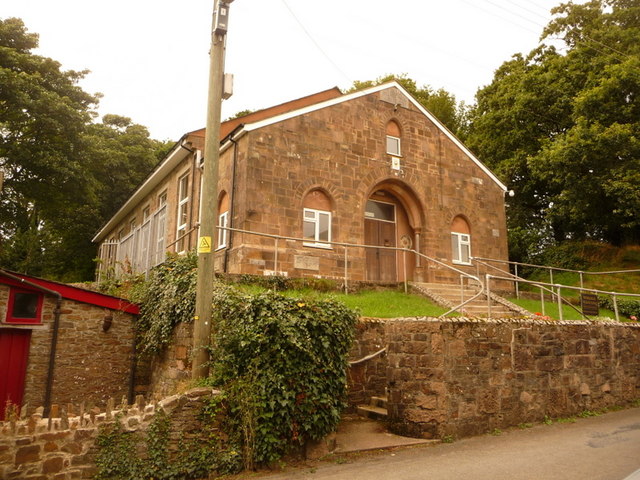
Photograph by Chris Downer (Wikimedia Commons)
Perhaps someone with access to records in St Petersburg and its considerably British community will be able to find out more about Eugénie and her early life, meanwhile she must remain a mystery.
[1] Testamentary records. England, Principal Probate Registry. 01 July 1912. WRIGHT, Matilda. Will. Copy provided by the Probate Search Service. https://probatesearch.service.gov.uk.
[2] Census. 1911. England, RD: Tonbridge. 57 London Road Tunbridge Wells. Ref: RG14PN4050 RG78PN156 RD50 SD1 ED11 SN338. https://www.findmypast.co.uk : accessed 13 November 2021.
[3] Burials (PR) England, St Lawrence Jewry, City of London. 15 May 1792. WRIGHT, John. Ancestry Collection: London, England, Church of England Baptisms, Marriages and Burials, 1538-1812. City of London. St Lawrence Jewry. 1716-1812. Image No: 152. https://www.ancestry.co.uk : accessed 16 September 2021.
[4] Baptisms (PR) England, Hartpury, Gloucestershire. 01 February 1819. WRIGHT, Matilda. Ancestry Collection: Gloucestershire, England, Church of England Baptisms, 1813-1913. Hartpury. 1813-1842. Image No: 15. https://www.ancestry.co.uk : accessed 16 November 2021.
[5] Burials (PR) England, Winkleigh, Devon. 28 July 1838. WRIGHT, Henry John. Find My Past Collection: Devon Burials. South West Heritage Trust Ref: 2989A/PR/1/13. https://www.findmypast.co.uk : accessed 13 November 2021.
[6] Burials (PR) England, Winkleigh, Devon. 10 April 1847. WRIGHT,Matilda. Find My Past Collection: Devon Burials. South West Heritage Trust Ref: 2989A/PR/1/13. https://www.findmypast.co.uk : accessed 16 November 2021.
[7] Burials (PR) England, Winkleigh, Devon. 17 April 1856. WRIGHT, Henry. Find My Past Collection: Devon Burials. South West Heritage Trust Ref: 2989A/PR/1/13. https://www.findmypast.co.uk : accessed 16 November 2021.
[8] Death Announcements, 1864. Exeter Flying Post – Wednesday 27 January 1864. Wright, Frederic. https://www.britishnewspaperarchive.co.uk/viewer/bl/0000103/18640127/010/0005 : accessed 05 November 2021.
[9] Census. 1861. England, RD: Bakewell. Ref: RG09. PN: 2542. f.22. p.10. https://www.findmypast.co.uk : accessed 16 November 2021.
[10] Testamentary records. England, Principal Probate Registry. 10 February 1864. WRIGHT, Frederic. Will. Copy provided by the Probate Search Service. https://probatesearch.service.gov.uk.
[11] Census. 1871. England, RD: Tonbridge. Ref: RG10. PN: 930. f. 144. p.10. https://www.findmypast.co.uk : accessed 16 November 2021.
[12] Star of Gwent – Friday 15 February 1878. https://www.britishnewspaperarchive.co.uk/viewer/bl/0003168/18780215/024/0003 : accessed 16 November 2021.
[13] Hastings and St Leonards Observer – Saturday 21 April. p.7. Larceny. https://www.britishnewspaperarchive.co.uk/viewer/bl/0000293/18830421/031/0007 : accessed 16 November 2021.
[14] Burials (PR) England, Winkleigh, Devon. 29 May 1912. WRIGHT, Matilda. Find My Past Collection: Devon Burials. South West Heritage Trust Ref: 2989A/PR/1/14. https://www.findmypast.co.uk : accessed 16 November 2021.
[15] Census. 1881. Scotland, RD: Dennistoun. 33 Roslea Drive. 644/3 39/ 15. https://www.scotlandspeople.gov.uk : accessed 16 November 2021.
[16] The National Archives (Great Britain) 1899, Scarborough, Yorkshire. 30 November 1899. CLAYWORTH, Eugenia. Ancestry Collection: Duplicate Certificates of Naturalisation, Declarations of British Nationality, and Declarations of Alienage; Class: HO 334; Piece 029: Certificate Numbers A10901 – A11300. https://ancestry.co.uk : accessed 05 November 2021.
[17] Census. 1851. England, RD: Greenwich. Ref: HO107. PN: 1586. f.258. p. 47. https://www.findmypast.co.uk : accessed 16 November 2021.
[18] Testamentary records. England, Principal Probate Registry. 10 August 1946. CLAYWORTH, Eugenie. Will. Copy provided by the Probate Search Service. https://probatesearch.service.gov.uk.
